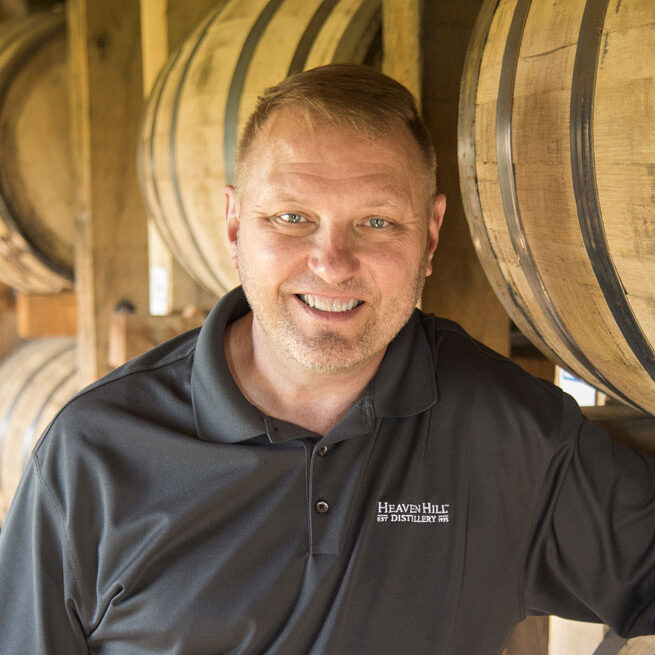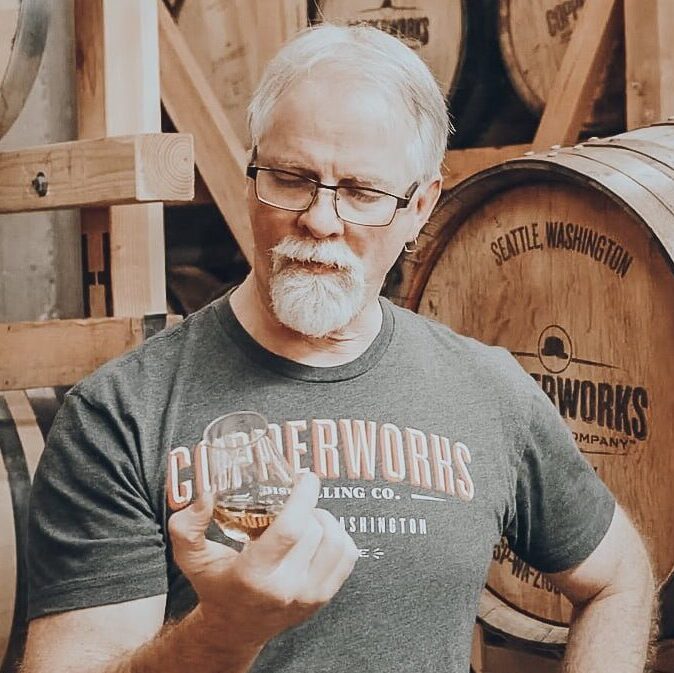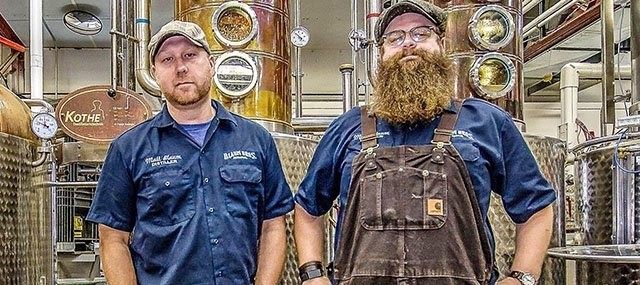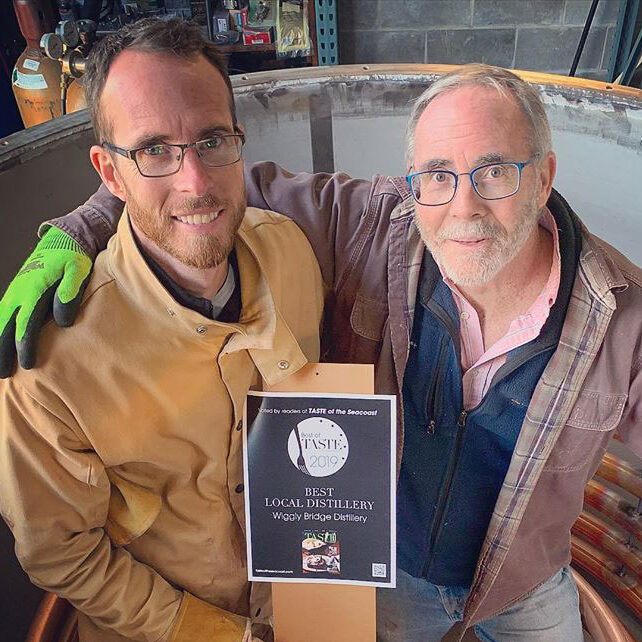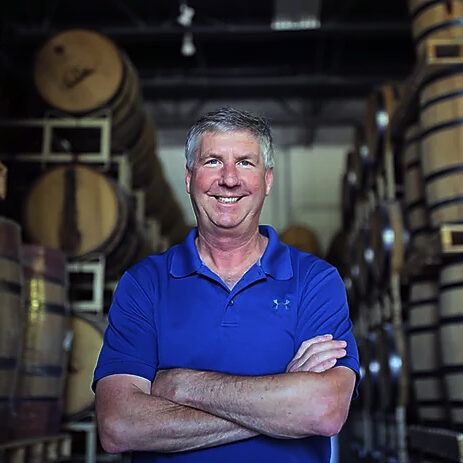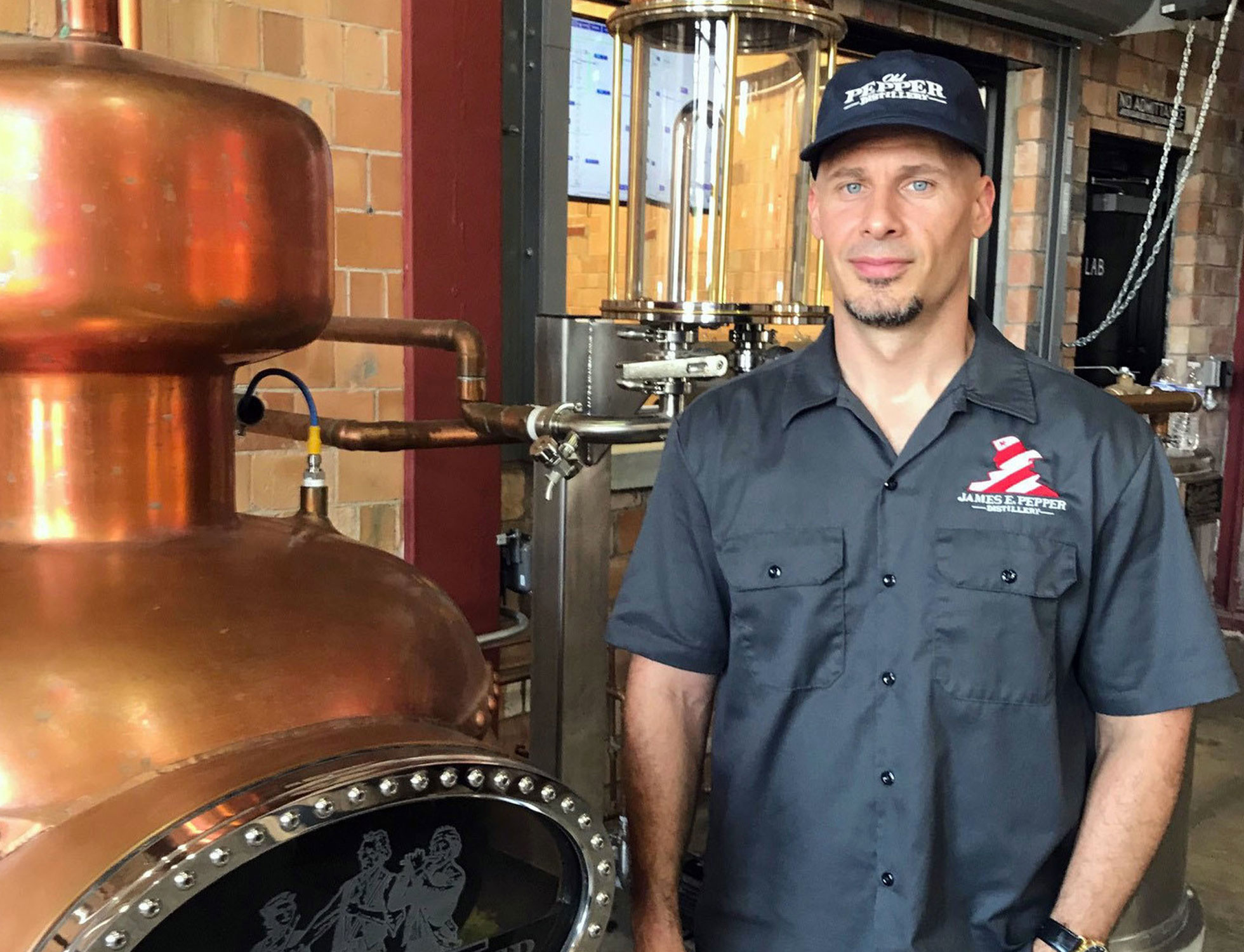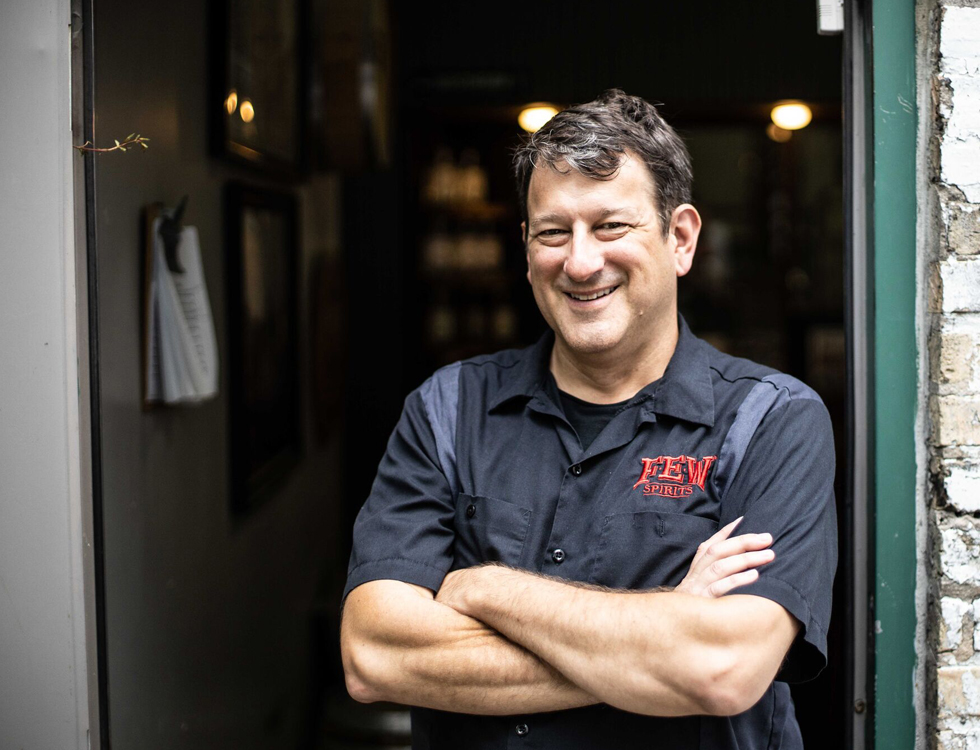Heavenhill Distillery: Bernie Lubbers
Kirsty Nicholson
“I got to work and travel with Parker Beam, who was our distiller for 56 years. Being able to pick his brain, and have him as a mentor can not be measured.”
“I got to work and travel with Parker Beam, who was our distiller for 56 years. Being able to pick his brain, and have him as a mentor can not be measured.”
Can you give us a bit of background about yourself and how you started in the whiskey industry?
I entered the industry Jan of 2005 doing events and promotions in the state of Kentucky for Jim Beam. 18 months later I was recruited by the brand team in charge of the Small Batch Collection as one of the first non-Beam family members to act as Ambassador for the Small Batch Bourbons, since Fred Noe’s picture was added to the Jim Beam label, and he was going on a world-wide promotional tour, and they wanted Knob Creek and the other small batch bourbons to be promoted alongside.
I was then hired away to Heaven Hill Distillery in September of 2012 and have been the Whiskey Ambassador here since then representing Evan Williams, Elijah Craig, Larceny, and all the other whiskeys Heaven Hill Distillery produces.
Can you tell us about your distillery, and what makes it unique?
First of all, and arguably most important, is that Heaven Hill Distillery is 100% family owned and family operated by the Shapira family who started the distillery in 1935.
After that, I believe that it is Heaven Hill’s House Style that sets us a part. Since Heaven Hill owns more barrels of whiskeys six years and older, across our portfolio, Heaven Hill whiskeys are typically aged longer, and bottled at a higher ABV than our competitors.
Are there any little ‘distilling’ secrets you can let us in on?
Since our whiskeys are highly regulated by the U.S. government standards, that can be hard to pin point, but I believe that the secrets we have is just the knowledge that our past distillers like Earl Beam and Parker Beam handed down, and worked with our sensory panel to create some of the most award winning small batch and single barrel whiskeys in the world.
Whiskey has been phenomenally successful in the United States and around the planet, why do you think this is compared to other spirits?
Bourbon and American Whiskey was over looked for so long due to several events and consumer preferences, but the quality was always there, even during whiskeys decline.
When different Whiskey tastings like Whiskey Fest, Whiskey Live!, Whiskeys Of the World, and others sprung up, folks were so interested in Scotch Malts, and over time, those same folks started to include American whiskeys as one of their regular drams.
Then with the rise of Social Media, more and more Whiskey and Bourbon Society’s sprung up, and that along with many more building blocks has led to this success, but the quality was always there.
In your years in the industry, what have been the biggest surprises you have faced?
I believe that what surprises me the most is that in an industry that is SO tightly regulated, just how much creativity and innovation takes place each and every year.
What are the big trends that are affecting the whiskey industry at the moment?
Bourbon Tourism
International Market expansion
Home Delivery
Internet Commerce
Are there any interesting stories from your time in the whiskey industry that you could share?
What could be more interesting than working directly with the giants that helped shape the industry. I got to work and travel with Parker Beam, who was our distiller for 56 years. Being able to pick his brain, and have him as a mentor can not be measured.
Then along with that, our owner and President; Max Shapira, is a true icon in the industry from the business side, and being able to watch him work, and having access to him is truly amazing.
What developments in the whiskey industry most excite you?
Bourbon Tourism. Seeing hundreds of thousands of bourbon enthusiasts from all over the world traveling to and visiting all of our visitors centers on the Bourbon Trail is very exciting.
What do you see as being the future of whiskey in the short term?
As I write this, we are in the middle of the COVID19 Pandemic, so seeing how the industry navigates this challenging.
In the short term, watching how we get Bourbon Tourism back up and functioning again will be one of the biggest challenges.
Why do you use the Glencairn Glass in your business and what makes it so special?
I do believe the Glencairn Glass has been SO embraced by the industry, AND the consumer, that people ask for it by name, or just use the name Glencairn Glass as they do “Xerox copy”.
Vist Heaven Hill Distillery website here
Copperworks Distillery: Jason Parker
Kirsty Nicholson
“Here at Copperworks, we try to be as transparent as possible. We publish every recipe for every batch on our website. We feel that if folks want to copy us, they best do it right.”
“Here at Copperworks, we try to be as transparent as possible. We publish every recipe for every batch on our website. We feel that if folks want to copy us, they best do it right.”
Can you give us a bit of background about yourself and how you started in the whiskey industry?
I was a craft brewer starting back in 1989, and opened a number of breweries (Pike Brewing, Fishtail Ales, and Pyramid). After brewing for many years, then 10 years in IT, I wanted to start making real high-quality spirits with the best ingredients.
We incorporated in 2011, and developed the recipes to open to the public in 2013. I had been a homebrewer in Kentucky for many years before heading out to Washington. I studied in England to learn how to make craft ale beer. I got out of brewing because the brewing industry was consolidating. In 2000, the industry wasn’t healthy, so I moved into IT.
In 2008, it became legal to distill in Washington State, so I thought that is really interesting and I dove into that. We did not want to open with a tiny scrappy place, so we went full throttle into this place, but may still have to build another in the future.
Can you tell us about your distillery, and what makes it unique?
One of the most important things when a distillery opens is what makes it different. We wanted to make whiskey, but not the whiskey everyone else was making. We weren’t going to make Bourbon, because that has already been done. The Scots make traditional product, the Irish make traditional product, the Japanese make traditional product and that is all great. We, however, wanted to make something different, so we started off making a high-quality beer and distill that into a really different whiskey.
Two big decisions that we made were to not make a brewery, but to partner with good breweries and have them make the mash. We make our beer at three different breweries and use brewer’s yeast, not distillery yeast. Secondly, we rejected the idea of buying a single artisan still that is more versatile, but not specifically designed for each product. Instead, We had our four stills made at Forsythe.
One other thing we try to do here is to be mentors to other prospective distillers trying to make their way into the business. We will take someone who is really serious about distilling and have them work with us at the distillery for a week to learn the ins & outs and the mechanics of what it takes to run a company like this and to make spirits.
Are there any little ‘distilling’ secrets you can let us in on?
Here at Copperworks, we try to be as transparent as possible. We publish every recipe for every batch on our website. We feel that if folks want to copy us, they best do it right.
Whiskey has been phenomenally successful in the United States and around the planet, why do you think this is compared to other spirits?
It is a temporary phenomenon, so there will be a dip again. It has 30-40 year cycles. Bourbon is being over-produced so that in 5 or 6 years, it will be difficult to give it away.
American whiskey will have its moment in the sun, but that too will die, and then it just may be Brandy that becomes the next big thing. Bourbon is pricing itself out to most consumers, but brandy is very affordable. It has a deep, sexy romantic past that consumers will be attracted to. That said, we have no intention to produce brandy, Just to drink it!
In your years in the industry, what have been the biggest surprises you have faced?
Here is one of the biggest surprises for me personally, I was very surprised how creative ownership could be. I was also surprised how the industry was blindsided over the years making legislation that actually left things wide open for new distillers to create so many new categories or so many new spirits, that it is a new renaissance in distilling.
We have so many new opportunities in front of us.
What are the big trends that are affecting the whiskey industry at the moment?
In Japan, the trend is to drink it in Highballs as opposed to neat like is frequently done here in America. I see the trend going away from using small barrels (thankfully) and towards using a variety of barrels for finishing.
The other factors that contribute to flavour, and that we are actively pursuing are local malts, and using different yeast strains.
The rapid maturation processes are interesting, but I would caution against putting anything out on the market before it is ready. We’re not interested in trying any rapid maturation processes.
Are there any interesting stories from your time in the whiskey industry that you could share?
One thing that I have really enjoyed in that the whiskey industry is super collaborative and have an attitude of “we are all in this together”.
It was great to find that there is room in this for all of us. They all feel that equal to their own success is the success of the industry on the whole.
What developments in the whiskey industry most excite you?
The concept of terroir. Selecting ingredients based on farm, variety, and vintage , and essentially treating grain like grapes, will give us endless ways to express variation in whiskey.
What do you see as being the future of whiskey in the short term?
Skyrocketing opportunities for anyone making something different and of quality. Whiskey has lots of opportunity for exploration.
Why do you use the Glencairn Glass in your business and what makes it so special?
I bought my first glasses for my own personal collection back in 2008.
I recognized that I couldn’t get the aromas & flavors from any other glass. So when we opened our tasting room, we needed a glass that would really showcase our spirits. In fact, our first order of Glencairn glasses came over from Scotland on the same barge as our stills!
Blaum Brothers
Kirsty Nicholson
“It all started when Mike got home–leave and we met in Florida with our families where we split and finished a bottle of subpar craft whiskey. Before taking the family to Animal Kingdom, we announced to our wives that we were going start our own distillery.”
“It all started when Mike got home–leave and we met in Florida with our families where we split and finished a bottle of subpar craft whiskey. Before taking the family to Animal Kingdom, we announced to our wives that we were going start our own distillery.”
Can you give us a bit of background about yourself and how you started in the whiskey industry?
Mike: We grew up as not only brothers but best friends. As we grew older and moved to different places, we still stayed very close. Our career paths were very different – Matt owned a nuclear pharmacy in Chicago, selling radioactive medicine to hospitals, while I worked overseas & in Washington DC for the NSA (The National Security Agency). It was during this time that I began to discover Scotch whisky and it became near & dear to me. I started to really get into it, Matt followed suit and we began to share our love of the spirit and became nerdy on the subject.
Matt: It all started when Mike got home-leave and we met in Florida with our families where we split and finished a bottle of subpar craft whiskey. Before taking the family to Animal Kingdom, we announced to our wives that we were going start our own distillery. This was April 2012; 4 months later Matt was looking at property in the beautiful Galena territory!
Can you tell us about your distillery, and what makes it unique?
Mike: The distillery is built inside a former Mormon Church, but what really makes the distillery unique is that we do not rely on any marketing story. We are coming from a place of two brothers who really enjoy working with each other and love making whiskey.
Plus, we enjoy the independence & honesty of doing things our way with no one else calling the shots. We are actually at the distillery all the time, and people get a kick out that.
Oh yeah, we still use a Flux Capacitor!
Are there any little ‘distilling’ secrets you can let us in on?
Matt: No bullshit. It is an art & a science that is constantly being tweaked, but we are quite transparent with everything.
Whiskey has been phenomenally successful in the United States and around the planet, why do you think this is compared to other spirits?
Mike: American heritage, classic Americana – at least how Bourbon & American whiskeys go. It has made a resurgence, but it is as American as baseball.
It is also a younger generation who really care about the ingredients and authenticity of what they buy now, and that has overflowed into spirits.
In your years in the industry, what have been the biggest surprises you have faced?
Mike: One would be the cohesiveness of the craft industry and willingness of industry people to work together. Many share the data & recipes. The community is amazing & unique. We have made a lot of good friends in this industry over the past 8 years or so.
What are the big trends that are affecting the whiskey industry at the moment?
Matt: It appears that people have gotten away from the stigma of sourced whiskey as long as there is honesty behind it. Also, we are big fans of the American single malt movement, because it is relevant to what single malt means globally.
Not sure where the future will take it, but I hope it comes to fruition.
Are there any interesting stories from your time in the whiskey industry that you could share?
Mike: In the town Galena, the former #1 tourist attraction used to be the post-Civil War home of Gen. Ulysses S. Grant, soon to be U.S. President, but since the founding of the Blaum Bros Distillery, the distillery has usurped the former General’s home for that top spot.
What developments in the whiskey industry most excite you?
Matt: We both appreciate how the whiskey community is getting nerdier & smarter, which is meshing well with how we do things. Innovation and industry folks taking the hard way is pretty cool.
What do you see as being the future of whiskey in the short term?
Matt: There are the uncertainties & the unknowns that make this difficult to answer. There will be a fair share of casualties this year so it will be interesting to see how it all pans out after this is all over.
Why do you use the Glencairn Glass in your business and what makes it so special?
Mike: We started using it because we used to drink Scotch whisky, we visited the distilleries in Scotland and it was the glass they used.
We became fanboys of the glass, collecting them at every distillery we visited, before we ever started our own distillery. We would seek them out whenever we visited a tasting room as a badge of honor.
We had the glass in our tasting rooms even before we had our whiskey in bottles.
Wiggly Bridge: Dave Woods
Kirsty Nicholson
“It all started during a family dinner with a joking statement of “lets make our own whisky.” With a shared love for good whisky and fascination to see how things are made, we decided to explore the idea.”
“It all started during a family dinner with a joking statement of “lets make our own whisky.” With a shared love for good whisky and fascination to see how things are made, we decided to explore the idea.”
Can you give us a bit of background about yourself and how you started in the whiskey industry?
I’m David Woods – Owner/Founder/Lead Distiller of Wiggly Bridge Distillery. My son and I founded and started Wiggly Bridge Distillery in 2013.
It all started during a family dinner with a joking statement of “lets make our own whisky.” With a shared love for good whisky and fascination to see how things are made, we decided to explore the idea. Although the distillery is where I spend my days, it is not my only focus.
My kids, their spouses, and long time employees help me run businesses ranging from carwashes, salon and spa, oil and propane company and a campground.
Can you tell us about your distillery, and what makes it unique?
Wiggly Bridge Distillery started in the heart of York Beach, Maine — a charming and historic seaside village settled in the early 1600’s, among the first in Maine. The ocean air and rocky coast of our own hometown is our inspiration, so it’s no wonder that we chose to start our distillery here.
My son David and I researched and studied (and some say obsessed) over how to build a still and process alcohol. Being fortunate enough to travel to the Caribbean we decided to build and operate a small hand made copper still on the island of Montserrat to put our research to the test. Turns out they were quite good at it and grew even more intrigued by the craft of small batch distilling.
What we made rivaled some of our favorite brands, with a bit of a twist. Now, winning awards, we are beginning to understand that we have created something very special.
Are there any little ‘distilling’ secrets you can let us in on?
We hand make our stills. My son taught himself how to weld on YouTube. We have saved a considerable about of money doing a lot of things ourselves —It’s a lot less bottles we need to sell to cover the extra cost
Whiskey has been phenomenally successful in the United States and around the planet, why do you think this is compared to other spirits?
There’s a history behind whiskey and making whiskey across all countries. It’s a spirit that’s associated with special occasions and because of the time associated with not only making but aging makes it more desirable.
Prohibition in the US really started it’s trajectory towards success because people want what they can’t have. Currently the internet and bartenders across the globe are creating craft cocktails with whisky that appeal not just to men, but to women as well.
In your years in the industry, what have been the biggest surprises you have faced?
The low volume of sales the majority (most) of craft distilleries have and their ability to hang on.
What are the big trends that are affecting the whiskey industry at the moment?
The increased consumption of alcoholic beverages always helps. The “craft” movement where people are wanting to use fresh ingredients and also wanting to use “craft” spirits to make those cocktails complete.
I think you will also see the rise and fall of many distilleries as current economic issues engulf our country.
Are there any interesting stories from your time in the whiskey industry that you could share?
I’m probably the least interesting person out there and don’t partake in many interesting stories.
What developments in the whiskey industry most excite you?
The return on our investment that is received from diligent hard work over the years.
What do you see as being the future of whiskey in the short term?
Shakeout amongst the craft distilleries along with its consolidation and sales increases to the general public looking for a more local option.
Why do you use the Glencairn Glass in your business and what makes it so special?
Like you, we are a family business and we couldn’t agree more that family values deliver better products and services.
We’ve been satisfied with each order in service and quality. Being able to say the Glencairn glasses we carry are official gives credibility and trust.
Grand Traverse Distillery: Kent Rabish
Kirsty Nicholson
“The different grains, the different types of smoke, the different mashbills. It is like the music of the 60s and how they changed the way we listen to music, the same is happening now in whiskey.”
“The different grains, the different types of smoke, the different mashbills. It is like the music of the 60s and how they changed the way we listen to music, the same is happening now in whiskey.”
Can you give us a bit of background about yourself and how you started in the whiskey industry?
My wife & I were visiting friends back in 2001 in Bend Oregon, when it was suggested that we stop off at the Bend Distillery tasting room for a drink. I was blown away by the quality! Here was American made product – vodka, gin, whiskey! It took me 3 years before I got things going, but were up & rolling in 2006, with a licence to distil in 2007. Before that I was a pharmaceutical rep, with a degree in biology & chemistry, plus worked my grandfather’s farm. He was named George Rabish, so we called our vodka Ole George. We are also of Polish descent so we love our vodka. We love supporting the local farmers growing American grain.
Can you tell us about your distillery, and what makes it unique?
#1 We are one of the very few that is grain to bottle. Everything is in-house!
#2 We are the oldest craft distillery in Michigan.
#3 We are a father & son operation, which is rare these days.
Are there any little ‘distilling’ secrets you can let us in on?
We have played around with the length of our fermentation, as well as the cuts to our heads & tails. We like to do stuff the way we do it. Not sure if that is an actual secret, however.
We played around with 38 different recipes for our gin before settling on our final design.
Whiskey has been phenomenally successful in the United States and around the planet, why do you think this is compared to other spirits?
You have vodka as a category, and there is varying quality, but there are more similarities than differences. But when it comes to whiskey, the differences are numerous! What kind & size of barrels are you using? What time of year are you making it? So many different mashbill combinations. There really is something for everyone! There are just so many different flavors of whiskey, thus more for palates to pickup.
In your years in the industry, what have been the biggest surprises you have faced?
What the markets have turned into as far as craft distilleries are concerned.
For instance, are the distillers authentic?
This is why we try to educate the public as much as we can on authenticity, and how to read a label so that they can see if the distiller is actually making what that person is drinking.
What are the big trends that are affecting the whiskey industry at the moment?
The creative aspect of the different mashbills that you see worldwide. How distillers are smoking their grain, or seeing smaller batches that are experiments. We ourselves produced a peated malted barley/rye and are continuously experimenting. Folks really are producing great stuff all over the world these days.
Are there any interesting stories from your time in the whiskey industry that you could share?
About 3 years ago, we had a Scottish family stop into the distillery. The father asked what is your oldest, which was only 4 years old. He said he only drank whisky that was at least 10 years old.
His kids convinced him to taste it, so he did, and then he discovered that he really liked it. It was great to open his mind up to an American whiskey!
What developments in the whiskey industry most excite you?
The creativity of new whiskey.
The different grains, the different types of smoke, the different mashbills. It is like the music of the 60s, and how that music changed the way that we listen to music.
That same thing is happening now in whiskey.
I would also like to see the category of American single malt become a reality. Why not? It would be great!
What do you see as being the future of whiskey in the short term?
I am hoping that everyone survives this current situation.
I think there will be a lot of craft distillers & craft brewers going out of business. We have a very creative industry and they keep on pushing the boundaries of what can be done, it would be great to see that continue.
Why do you use the Glencairn Glass in your business and what makes it so special?
For us & for me, it is the perfect glass to drink spirits. It is the gold standard! It’s perfect for nosing & drinking. We sell a lot of them out of the tasting room, plus I have loads around the house that I always pull out to test friends out on whiskeys. It is just the perfect whiskey glass!
I really love the (Canadian) Mixer Glass as well.
James E. Pepper: Amir Peay
Kirsty Nicholson
“The different grains, the different types of smoke, the different mashbills. It is like the music of the 60s and how they changed the way we listen to music, the same is happening now in whiskey.”
Can you give us a bit of background about yourself and how you started in the whiskey industry?
I spent a lot of years as a young man working in the restaurant and bar industry. Studied Philosophy in college at UC Santa Barbara and couldn’t find a job. So I started to publish a small newsletter called Wine & Dine covering the wine scene there. This began a wine collection that really developed my palate. I was also a freelance journalist for boxing for a while, and used to get the best seats at big prize-fights.
Later I developed an appreciation for whiskey, specifically Irish whiskey and Bourbon, and wanted to get into the whiskey business. All of these experiences led me to create a brand of Irish whiskey called John L Sullivan. I am also a huge history buff and later discovered an iconic and forgotten old bourbon brand called, James E. Pepper; and I acquired the rights to the brand in 2008.
Can you tell us about your distillery, and what makes it unique?
We are in the actual historic Pepper distillery that was initially built in 1880 – DSP-KY-5. We have a museum at the distillery that goes over the history of the brand from 1780 til today, and tells the story of uncovering the brand through a decade of historic research, plus the rebuilding of the distillery after it was abandoned for over 50 years.
We have had a great response from our visitors, becoming the #1 rated attraction on Trip Advisor in Lexington. There is so much history that we reincorporated into the distillery, such as using the original limestone well and producing the original Pepper mash bill that was last produced in 1967 when the plant shut down. We also have a beautiful custom copper still built by Vendome which was inspired by the system they built at our distillery in 1934, the year Prohibition was repealed in Kentucky.
Are there any little ‘distilling’ secrets you can let us in on?
I’ve got a good one and for all the tradition we follow, this one is anti-tradition: we use a sweet mash process in our production, as opposed to sour mash.
Sour mash was famously associated with the Peppers, but with the scope of our operation today and the tools at our disposal, from a quality point of view we choose to go with a sweet mash operation.
Whiskey has been phenomenally successful in the United States and around the planet, why do you think this is compared to other spirits?
Whiskey is the overnight success that took over 1000 years to take flight. And at the end of the day it is such a complex and flavorful spirit, with a very deep level of artistry and nuance across regions, that it simply stands apart from many other spirits objectively on its own.
In your years in the industry, what have been the biggest surprises you have faced?
That is a no brainer: Coronavirus! This is just devastating, especially to the people who own and work at restaurants & bars. My heart really goes out to them. No one saw this coming.
What are the big trends that are affecting the whiskey industry at the moment?
A shift in consumption from the on-premise to drinking at home. Consumers may also be a bit less willing to experiment on new brands – they want tried & true quality at a reasonable price.
It is also an interesting time to see the next stages of the “craft” whiskey market, as you are starting to see some nice, well-aged products coming out from smaller, independent producers.
Are there any interesting stories from your time in the whiskey industry that you could share?
We recently had Norman Reedus from “The Walking Dead” film an episode of his show, ‘Ride with Norman Reedus at the distillery. That was cool.
Another very cool thing was that after we opened the distillery for tours, the great-great niece of Ella Offutt Pepper, the widow of James E Pepper, visited us and donated a cache of photos, letters & mementos from James E. Pepper. She even gave us his personal wallet, with his old logo emblazoned on the inside.
What developments in the whiskey industry most excite you?
I think it is the accumulation of experience & knowledge that has built up in producing whiskey.
It is really an amazing time to produce whiskey as we have all the knowledge and wisdom of prior generations at our finger tips, coupled with the greatest level of understanding from a technical and informational stand point. Combined those 2 things are very empowering and exciting.
What do you see as being the future of whiskey in the short term?
Get through the coronavirus…
Why do you use the Glencairn Glass in your business and what makes it so special?
We use the Glencairn Glasses because, in my opinion, it is the best glass in the business.
It is refined and elegant, yet sturdy. It is not overly finessed, and can be the glass for the executive as well as the working-class guy or gal. We give each visitor a branded glass on our distillery tours.
Few Spirits: Paul Hletko
Kirsty Nicholson
“A guy came up to me with a Glencairn glass full of FEW Rye whiskey and told me he hadn’t spoken his father in 30 years, but they meet in Paris and rekindled their relationship over a bottle of FEW whiskey”
“A guy came up to me with a Glencairn glass full of FEW Rye whiskey and told me he hadn’t spoken his father in 30 years, but they meet in Paris and rekindled their relationship over a bottle of FEW whiskey”
Can you give us a bit of background about yourself and how you started in the whiskey industry?
It seemed like a good idea at the time. But there’s also a family element too. Prior to WWII, my grandfather’s family owned a brewery which was confiscated by the Nazis. All my relatives, with the exception of my grandfather were killed in the extermination camps. I wanted to continue the family legacy, but at the time, instead of brewing, I saw a void in the market for Bourbon & rye whiskey, so I thought I would start a distillery.
Can you tell us about your distillery, and what makes it unique?
FEW is a small distillery, and the fact that is located in Evanston, the home of Temperance Movement of the 1800s in the Midwest, and that I was very instrumental in having those laws overturned, provides our distillery with a unique character. We are also a grain to bottle distillery, and put no restrictions on the creativity in our mash bills, ingredients or distilling techniques.
Are there any little ‘distilling’ secrets you can let us in on?
Well, if something is really a secret, then I can’t really tell you, now can I? One thing we do is make our whiskey in the fermenters than in the barrel. We take a brewer’s approach to making our mash.
Whiskey has been phenomenally successful in the United States and around the planet, why do you think this is compared to other spirits?
The rise & flows of personal tastes over the past 20-30 years towards fuller flavors. Plus, the rise of craft beers and shows like “Mad Men” making it culturally popular. Some folks may also follow the example of their elders, prior generations or bosses at work. Some just to be different.
In your years in the industry, what have been the biggest surprises you have faced?
HR = finding good people is incredibly hard.
Also, the fact that you learn lessons every day, and the hard lessons are the ones that you don’t forget.
What are the big trends that are affecting the whiskey industry at the moment?
The rise of the handcrafted whiskey distilleries and the response of the big guys, mainly copying the little guys.
Are there any interesting stories from your time in the whiskey industry that you could share?
The stories that really stick with me are the ones where folks come up to me, tell me that they shared a bottle of FEW with their wife one night, and then 9 months later had a kid! Or the time a guy came up to me with a Glencairn glass full of FEW Rye whiskey and told me he hadn’t spoken his father in 30 years, but they meet in Paris and rekindled their relationship over a bottle of FEW whiskey. It has been amazing the range of people I have gotten to meet from politicians to rock stars to legends in the drink industry (and Marty Duffy).
What developments in the whiskey industry most excite you?
I think it is a really tough moment right now, and it is hard to know what it will all look like when this is all over.
What the impact will be on the 3-tier system in some states, that will have a major impact on the entire drink industry.
What do you see as being the future of whiskey in the short term?
Going to be a whole lot of change, though it will grow and find new fans. Right now, people might be stocking up on the big handled bottles of whiskey brands, but after the lockdown is done people will go after the higher end, better quality whiskey that they were used to.
Why do you use the Glencairn Glass in your business and what makes it so special?
I think the Glencairn Glass is a super important part of the industry and that it is the best glass I have ever used.
It is iconic! It’s the glass I would want to be drinking from at home because it is the glass that the professionals use.
Sure, I went catting with other glasses in the past, but they never measure up to the Glencairn Glass. Also, they are super affordable.
